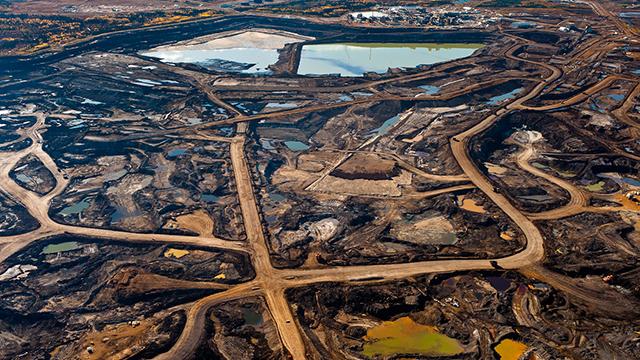
An alliance of Canadian and U.S. aboriginal groups vowed on Wednesday to block three multibillion-dollar oil pipelines that are planned to transport oil from the Alberta tar sands, saying they are prepared to take physical action to stop them.
The Canadian government, faced with falling revenues due to pipeline bottlenecks and a glut that has cut the price for Alberta oil, say the projects are a national priority and will help diversify exports away from the U.S. market.
But the alliance of 10 native bands - all of whose territories are either near the crude-rich tar sands or on the proposed pipeline routes - complain Ottawa and Washington are ignoring their rights.
They also say building the pipelines would boost carbon-intensive oil sands production and therefore speed up the pace of climate change.
"Indigenous people are coming together with many, many allies across the United States and Canada, and we will not allow these pipelines to cross our territories," said Phil Lane Jr, a hereditary chief from the Ihanktonwan Dakota in the state of South Dakota.
"Along with every single legal thing that can be done, there is direct action going on now to plan how to physically stop the pipelines," he told a news conference in Ottawa.
The pipeline projects in question are:
-
TransCanada Corp's Keystone XL to Texas, which is awaiting approval from Washington
-
Enbridge Inc's Northern Gateway to the Pacific Coast, which if built will help export oil to China
-
Kinder Morgan Energy Partners LP's plans to more than double the capacity of its existing Trans Mountain pipeline to Vancouver
Some Canadian aboriginal bands briefly blockaded roads and rail lines in January as part of a national protest dubbed "Idle No More" against the poor living conditions that many natives endure.
They say the Canadian government is ignoring treaties signed with native bands in the 18th and 19th centuries. These agreements, they say, give aboriginal groups a major say in what happens on their territories.
"They've been stealing from us for the last 200 years ... now they're going to destroy our land? We're not going to let that happen," said Martin Louie of the Nadleh Whut'en First Nation in British Columbia.
"If we have to go to court, if we have to stand in front of any of their machines that are going to take the oil through, we are going to do that. We're up against a wall here. We have nowhere else to go."
U.S. environmentalists are urging President Barack Obama to block the Keystone XL pipeline. Greens and native bands also oppose the Northern Gateway, saying if there were a spill it could cause an environmental disaster and jeopardize traditional ways.
Canada's Conservative government on Tuesday appointed a lawyer to gather views of native groups across British Columbia on energy development and report back to Ottawa.
Federal Natural Resources Minister Joe Oliver, asked abut the bands' comments on Wednesday, said the government expects citizens to respect the law.
"If we do not go ahead with infrastructure, with pipelines to move our resources to tidewater and on to markets that want the resources, we will see them stranded and our legacy lost," he told the Canadian Broadcasting Corp.
"The people who will be hurt by this will be Canadians and we don't want that happen and we are determined it will not happen," he said.
The Nadleh Whut'en have teamed with four other British Columbia First Nations against Northern Gateway in a group called Yinka Dene Alliance. They have long said they will not allow the pipeline, which is now the subject of public hearings, to go through their territories.
For its part, Enbridge said it is well aware of the group's opposition. The company says it has agreements with 60 percent of the aboriginal communities along Northern Gateway's proposed route that will give those communities equity stakes in the project.
"The Yinka Dene Alliance's position hasn't changed for years, even with several attempts to sit down and discuss issues and try to address their concerns," Enbridge spokesman Todd Nogier said. "We see the federal government's announcement yesterday (of a representative to meet with natives) as a very positive one. It's one that works to address bigger issues beyond any single project."
3 WAYS TO SHOW YOUR SUPPORT
- Log in to post comments















